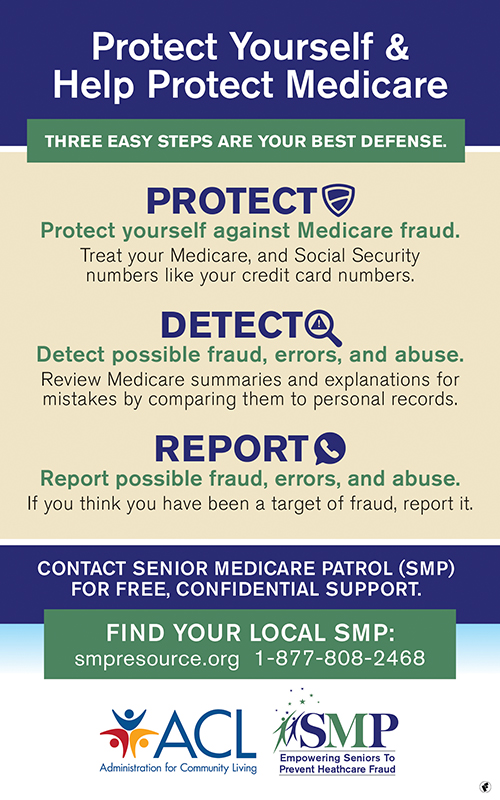
3 Steps to Protect Yourself from Medicare Fraud
Every day, Medicare fraud affects people with Medicare and their families across the U.S. – regardless of background – robbing them of hard-earned money and peace of mind.
Scammers know the ins and outs of the Medicare system and their attempts can be well thought-out enough that it’s not always easy to know when and where fraud is occurring. By remembering some simple but effective tips, you can protect yourself against scams, including identity theft and prescription drug fraud. Remembering to protect, detect and report fraud helps everyone, including you.


- Protect
Protecting your personal information is your best line of defense against health care fraud. Treat Medicare, Medicaid and Social Security numbers like credit card numbers. Never give them to a stranger and don’t carry your cards unless you need them for appointments. Medicare doesn’t call or visit to sell you anything. Outside of a trusted health care setting, never give this information to anyone who asks for it.
- Detect
No matter how careful you are, you may be targeted for fraud. Always review your Medicare statements closely. Things to look for include charges for something you didn’t purchase or receive, duplicate charges and charges for services not ordered by your doctor. Compare these documents to your personal records and receipts. Recording medical visits and procedures in a journal or on a calendar can help you keep track of what happened at each appointment and make it easier to spot inaccuracies.
- Report
If you suspect you’ve been a target of fraud, report it. This can help you and others at risk for fraud. If you have questions about your Medicare statements, call your health care provider.
If you’re uncomfortable calling or are not satisfied with the response, help is available through your local Senior Medicare Patrol (SMP). SMP volunteers work with Medicare beneficiaries and their families and caregivers to stop health care fraud, errors and abuse. You can also report suspicious calls and direct general questions through this resource. You can find your local SMP program by calling 1-877-808-2468 or at SMPresource.org.
Suspected fraud can also be reported to 1-800-Medicare or by calling 1-800-HHS-TIPS.
Don’t hesitate if you need help
Funded by the Administration for Community Living, part of the U.S. Department of Health and Human Services, the SMP program provides outreach, counseling and education by highly trained volunteers in a variety of locations. For free, confidential support, contact your local SMP program.
Source:
Administration for Community Living
















